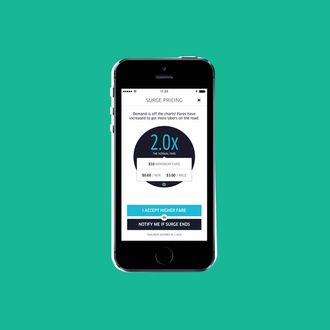
People kind of hate Uber’s surge pricing; this, we know. But your decision whether or not to suck it up and go ahead and request the service anyway depends at least partially on something unexpected, according to the company’s user data: whether or not the surge price is a round number.
This week, NPR’s Hidden Brain podcast interviewed Keith Chen, head of economic research at Uber and an economics professor at UCLA’s Anderson School of Management. Chen told host Shankar Vedantam something kind of strange he noticed from his data. When the surge moves from 1.9 times the normal fare to 2.0, “you see six times larger of a drop in demand than you saw from going from 1.8 to 1.9,” Chen said. “The amount more that you’re paying for the trip is the same between those two steps, but 2.0 just feels viscerally larger to people.” You can handle 1.9. But 2.0? No, thanks – you’re no sucker.
It gets weirder. According to Chen’s user data, people are also more likely to order the Uber when the surge pricing is at 2.1 times the normal rate than they are when it’s at 2.0. Put another way: People would rather pay more for their car service than pay a surge price that happens to be a round number.
There must be something, then, about a number like 2.1. Perhaps, as Vedantam theorized, its specificity convinces people that they need to take it more seriously than a round number – because, surely, there must be some good reason for that specificity. Think about what would happen if a friend told you to meet him for dinner at 7:03. You would think that was odd, certainly, but you’d also get his larger point – that he needs you to be on time. This is a point, by the way, the behavioral economist Dan Ariely made to Science of Us last summer, after I asked him about a sign announcing that the Second Avenue subway was “82.3% COMPLETE.” Really, guys, it’s as if the sign was saying. Seriously, this time, it’s almost done.
Chen’s data can’t tell him why Uber users are doing what they’re doing, but he agrees that there’s something about a round number that feels pulled-out-of-thin-air. “When you tell someone your trip is going to be two times more than it usually costs, they think, ‘Well, that’s capricious and unfair. Somebody just made that up. They must have seen it was raining and just decided to mess with me, right?’” he told Vedantam. “Whereas if you say, ‘Oh, your trip is going to be 2.1 times more than it normally does, [people think] ‘Wow, there must be some smart algorithm in the background here that’s at work.’ It doesn’t seem quite as unfair.” A super-specific price like 1.9 times the normal rate – that, we feel like can trust. But 2.0 times? A likely story.




